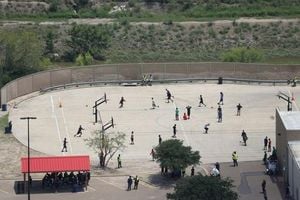Israel's renewed military offensive in the Gaza Strip threatens to be even deadlier and more destructive than the last, as it pursues wider aims with far fewer constraints. A surprise bombardment early Tuesday, March 18, 2025, ended the ceasefire and killed hundreds of Palestinians, with Israeli leaders vowing to ramp up the intensity of their operations should Hamas fail to release hostages.
President Donald Trump has expressed full support for the new military campaign and suggested last month that Gaza’s two million Palestinians be resettled in other countries, a proposal that has drawn significant criticism. The situation in Gaza is further complicated as the Biden administration seems less inclined than before to pressure Israel regarding civilian casualties, which were significant during the previous stages of the war.
Defense Minister Israel Katz stated on March 19, 2025, that “if all the Israeli hostages are not released and Hamas is not expelled from Gaza, Israel will act with an intensity that you have not seen.” These statements indicate a potential escalation that might echo the earlier phase of the conflict, where more than 48,000 Palestinians were reportedly killed according to Gaza's Health Ministry. The majority of those casualties were civilians, with claims by the ministry suggesting that over half the deceased were women and children.
The escalation follows the hostilities triggered by Hamas's assault on October 7, 2023, which resulted in the deaths of approximately 1,200 individuals, overwhelmingly civilians, and the capture of 251 hostages. Initially, the Biden administration had provided considerable military and diplomatic backing to Israel, advocating for humanitarian aid access and efforts to limit civilian casualties, though these efforts have wavered as support from the Trump administration appears to have diminished any restrictions on Israel's military actions.
In the earlier months of the conflict, Biden's administration rebuked Israel for its excessive violence against civilians and urged for a ceasefire, only to see Israel continue its offensive. Now, with Trump in office, officials report that the U.S. seems far less concerned with the implications of military operations on civilian populations, as evidenced by the latest bombardments.
In a sharp shift from the prior administration’s approach, the Trump administration’s current stance on foreign policy regarding Gaza enables Israel to act with little oversight. Trump’s remarks about potentially relocating Palestinian residents have not only been controversial; they have garnered rebukes from human rights groups who see them as a violation of international law.
Reacting to the renewed conflict, Israel's far-right national security minister, Itamar Ben-Gvir, who had previously resigned in protest of the ceasefire, returned to the government shortly after Tuesday’s strikes, further solidifying Netanyahu's hardline coalition. Such developments point toward a continuation of aggressive policies, with plans reportedly being drawn up to encourage voluntary migration out of Gaza, thereby creating pathways for potential settlement expansion.
The war’s renewal has met with divided reactions on the ground. While Hamas still maintains control over Gaza, its leadership has suffered considerable losses, and its military capabilities have diminished significantly. Israeli claims suggest that around 20,000 militants have been killed since the beginning of hostilities, though these assertions remain unverified.
Most notably, on Thursday, March 20, 2025, Hamas launched three rockets in its first attack since the resumption of hostilities. No casualties were reported, but the event alarmed the public in Tel Aviv, hinting at the precarious security situation that persists in the region.
International scrutiny around the current military operations is expected to be less intense than earlier in the conflict. The previous phase saw widespread protests and criticisms from various countries, allegations of genocide at international courts, and significant public outcry. The Trump administration, however, has taken steps to stifle dissent domestically, making protests surrounding Israeli actions less likely this time around.
In light of the responses from both the United States and international bodies, critics of Israel’s military actions may find it increasingly difficult to rally support against what many argue is a disproportionate response to the threats posed by Hamas. With Trump signing an executive order earlier this year imposing sanctions on the ICC, the road ahead looks unsettling not just for Palestinians but for the realm of international human rights activism as well.
Despite the shifting dynamics in leadership and international relations, the fundamental issues embedded within the Israel-Palestine conflict remain largely unresolved. As violence re-escalates in Gaza, the humanitarian crisis threatens to exacerbate significantly, raising concerns about the future of regional stability.



